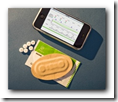 All you have to do is pair it and add it to your network! Not too long ago we had the IPill, so here comes Raisin, still in clinical trials at present. The information is time stamped and sent to the internet where it can be viewed by a physician, this is almost like outer space but as I always say, look around this blog long enough and you will find a lot of medical devices and the likes that might shock you that they do exist. I never thought about Bluetooth being consumable before. It will send back your heartbeat and even whether you are sitting down or standing!
All you have to do is pair it and add it to your network! Not too long ago we had the IPill, so here comes Raisin, still in clinical trials at present. The information is time stamped and sent to the internet where it can be viewed by a physician, this is almost like outer space but as I always say, look around this blog long enough and you will find a lot of medical devices and the likes that might shock you that they do exist. I never thought about Bluetooth being consumable before. It will send back your heartbeat and even whether you are sitting down or standing!
This product though is around 2 years from being on the market, even if the FDA approves next year, which is what they are hoping for. Is is a device or a drug or both? This product could open up a whole new category at the FDA, a product that is both a drug and a device. The targets are chronic disease treatment and once you’re on this pill, there will be no fudging as far as when and what time you took your pill as others will be watching. The pill talks to the patch, and the patch talks to a Bluetooth cell phone or computer to finish the reporting process. No mention on how much the cost will be for the big brother Bluetooth pills yet. Must be attractive to investors as they have raised over 90 million already. BD
Over the next few years popping a pill could be more than just taking a drug and hoping it works. A biomedical company has
created a system to embed tiny computers and sensors into drugs and link them to a cellphone or the internet in a bid to make the monitoring of drug efficacy foolproof.
When swallowed the chips send a signal to the patch. The patch has accelerometers and amplifiers to track heart rate, respiratory rate, temperature and body angle to determine if the patient is lying down or standing up.
That information is transmitted via Bluetooth to an online repository and can show how the body is responding to the drug, says Savage.
The networked pill product, branded Raisin, is still in clinical trials, but it shows how technology and medicine are being melded in ways that are likely to change how we take drugs. More broadly, they could be part of a suite of technologies that enable personalized medicine, the long-promoted ideal of tailoring drug treatments to an individual's physiological and genetic profile.
Proteus executives have compared their system to the electronics that help mechanics diagnose problems in cars.
Proteus’s Raisin™ System offers the potential to transform the way heart failure and other chronic diseases are managed. The initial application of the Raisin System is for the treatment of patients with heart failure. The system senses and records the precise time a patient takes one or more microchip-enabled drugs, providing physiologic feedback and decision-support to the patient, caregivers and clinicians, thus facilitating a cost-effective pathway to improved patient outcomes through personalized medicine.
Edible Electronics Monitor Drugs in Your Body | Wired Science from Wired.com
Related Reading:


